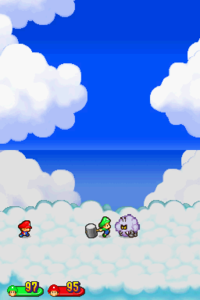Gnarantula: Difference between revisions
LinkTheLefty (talk | contribs) m (Simplified to the cloud and jumper.) |
|||
| (71 intermediate revisions by 43 users not shown) | |||
| Line 1: | Line 1: | ||
{{ | {{species infobox | ||
| | |image=[[File:MLPiT Gnarantula.gif]]<br>Sprite of a cloud-covered Gnarantula from ''Mario & Luigi: Partners in Time'' | ||
|first_appearance=''[[Mario & Luigi: Partners in Time]]'' ([[List of games by date#2005|2005]]) | |||
| | |comparable=[[Lakitu's Cloud]]<br>[[Spoing]]}} | ||
[[File:Gnarantula.png|thumb|left|[[Baby Luigi]] using his [[hammer]] on a Gnarantula]] | |||
'''Gnarantulas''' are cloud-covered arachnids found in ''[[Mario & Luigi: Partners in Time]]'', found in the skies or caves in [[Yoshi's Island (location)|Yoshi's Island]]. Their name is a portmanteau of the words "gnaw" and "tarantula," though they more closely resemble ants, having only four visible legs, sideways jaws, and two antennae. Only [[Baby Mario]] and [[Baby Luigi]] can encounter them. The cloud hides their body; when attacked, a Gnarantula's unmasked form is revealed. There are two forms of Gnarantulas: the green, spiked Gnarantula, and the red, spike-less Gnarantula. A [[jump]] [[First Strike]] is always effective and instantly removes the clouds from all Gnarantulas in the battle. Both varieties are vulnerable to [[Ice Flower]]s. To attack, a Gnarantula jumps, then jumps again in mid-air, eventually falling to the ground and crushing an opponent. This attack can be countered with a [[hammer]]. | |||
Gnarantulas can be fought alongside [[Pidgit]]s. If there are four Gnaratulas with no other enemies in battle, all the Gnaratulas to the right will be green and all the Gnaratulas on the left will be red. | |||
}} | |||
[[ | |||
== | Gnarantulas seem to reference [[Lakitu]]s and [[Spiny|Spinies]], with each of its three forms resembling the latter or the former in some way (red Gnarantulas resemble cloud-less Lakitus with the colours of Spinies, green ones resemble Spinies with the colours of Lakitus, and the clouds they have look like the [[Lakitu's Cloud|clouds on which Lakitus are often seen]]). The Gnarantulas, particularly the red variant, also visually resemble the [[Spoing]] and [[Spangler]] enemies from ''[[Super Mario Galaxy]]''. | ||
==Statistics== | |||
===''Mario & Luigi: Partners in Time''=== | |||
{{:Mario & Luigi: Partners in Time bestiary|transcludesection=Gnarantula|align=horizontal|image=[[File:MLPiT Green Gnarantula.gif]] [[File:MLPiT Gnarantula.gif]] [[File:MLPiT Red Gnarantula.gif]]}} | |||
==Names in other | ==Names in other languages== | ||
{{ | {{foreign names | ||
|Jap=クモンチュラ | |Jap=クモンチュラ | ||
|JapM= | |JapR=Kumonchura | ||
|JapM=Portmanteau of「雲」(''kumo'', cloud),「蜘蛛」(''kumo'', spider), and "tarantula" | |||
|Spa=Nuberántula | |Spa=Nuberántula | ||
|SpaM=From | |SpaM=From "nube" (cloud) and "tarántula" | ||
| | |Fre=Nebulantula | ||
| | |FreM=From "nebula" and "tarantula" | ||
|Ita=Gnarantola | |||
{{ | |ItaM=Masculine form of English name "Gnarantula" | ||
|Kor=뭉게튤라 | |||
|KorR=Munggetyulla | |||
|KorM=From "뭉게구름" (''munggegureum'', cumulus) and "타란튤라" (''tarantyulla'', tarantula) | |||
|Ger=Gnarantula | |||
}} | |||
{{M&LPIT}} | |||
[[Category:Arachnids]] | [[Category:Arachnids]] | ||
[[Category:Mario & Luigi | [[Category:Mario & Luigi: Partners in Time enemies]] | ||
[[de:Gnarantula]] | |||
[[it:Gnarantola]] | |||
Latest revision as of 11:14, October 24, 2024
| Gnarantula | |||
|---|---|---|---|
Sprite of a cloud-covered Gnarantula from Mario & Luigi: Partners in Time | |||
| First appearance | Mario & Luigi: Partners in Time (2005) | ||
| |||
Gnarantulas are cloud-covered arachnids found in Mario & Luigi: Partners in Time, found in the skies or caves in Yoshi's Island. Their name is a portmanteau of the words "gnaw" and "tarantula," though they more closely resemble ants, having only four visible legs, sideways jaws, and two antennae. Only Baby Mario and Baby Luigi can encounter them. The cloud hides their body; when attacked, a Gnarantula's unmasked form is revealed. There are two forms of Gnarantulas: the green, spiked Gnarantula, and the red, spike-less Gnarantula. A jump First Strike is always effective and instantly removes the clouds from all Gnarantulas in the battle. Both varieties are vulnerable to Ice Flowers. To attack, a Gnarantula jumps, then jumps again in mid-air, eventually falling to the ground and crushing an opponent. This attack can be countered with a hammer.
Gnarantulas can be fought alongside Pidgits. If there are four Gnaratulas with no other enemies in battle, all the Gnaratulas to the right will be green and all the Gnaratulas on the left will be red.
Gnarantulas seem to reference Lakitus and Spinies, with each of its three forms resembling the latter or the former in some way (red Gnarantulas resemble cloud-less Lakitus with the colours of Spinies, green ones resemble Spinies with the colours of Lakitus, and the clouds they have look like the clouds on which Lakitus are often seen). The Gnarantulas, particularly the red variant, also visually resemble the Spoing and Spangler enemies from Super Mario Galaxy.
Statistics[edit]
Mario & Luigi: Partners in Time[edit]
| Mario & Luigi: Partners in Time enemy | ||||||||
|---|---|---|---|---|---|---|---|---|
| Gnarantula | ||||||||
| HP | 30 | POW | 34 (28) | Defense | 23 (24) | |||
| Experience | 15 | Coins | 5 | Speed | 34 | |||
| Location(s) | Yoshi's Island | Role | Common | Item drop | Smash Egg – 8% 1-Up Mushroom – 2% | |||
| Level | 9 | Battled by | Baby Mario & Baby Luigi | |||||
| Notice: Stats in parentheses are from the Japanese and European versions (if they differ from the original American release). | ||||||||
Names in other languages[edit]
| Language | Name | Meaning | Notes |
|---|---|---|---|
| Japanese | クモンチュラ[?] Kumonchura |
Portmanteau of「雲」(kumo, cloud),「蜘蛛」(kumo, spider), and "tarantula" | |
| French | Nebulantula[?] | From "nebula" and "tarantula" | |
| German | Gnarantula[?] | - | |
| Italian | Gnarantola[?] | Masculine form of English name "Gnarantula" | |
| Korean | 뭉게튤라[?] Munggetyulla |
From "뭉게구름" (munggegureum, cumulus) and "타란튤라" (tarantyulla, tarantula) | |
| Spanish | Nuberántula[?] | From "nube" (cloud) and "tarántula" |
